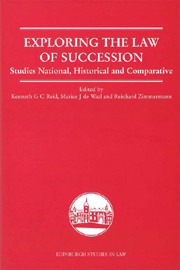Book contents
- Frontmatter
- Contents
- Preface
- List of Contributors
- List of Abbreviations
- Table of Cases
- 1 A Comparative Overview
- 2 Compulsory Heirship in Roman Law
- 3 Succession Law in Scotland – a Historical Perspective
- 4 Succession Law in South Africa – a Historical Perspective
- 5 Freedom of Testation and the Ageing Testator
- 6 Testamentary Conditions and Public Policy
- 7 Forfeiture Clauses and Events in Scots Law
- 8 Revocation of Wills by Changed Circumstances
- 9 Fideicommissary Substitutions: Scots Law in Historical and Comparative Perspective
- 10 The conditio si institutus sine liberis decesserit in Scots and South African Law
- 11 The New Dutch Law of Succession
- 12 Revocability of Mutual Wills
- 13 Succession Agreements in South African and Scots Law
- Index
6 - Testamentary Conditions and Public Policy
Published online by Cambridge University Press: 12 September 2012
- Frontmatter
- Contents
- Preface
- List of Contributors
- List of Abbreviations
- Table of Cases
- 1 A Comparative Overview
- 2 Compulsory Heirship in Roman Law
- 3 Succession Law in Scotland – a Historical Perspective
- 4 Succession Law in South Africa – a Historical Perspective
- 5 Freedom of Testation and the Ageing Testator
- 6 Testamentary Conditions and Public Policy
- 7 Forfeiture Clauses and Events in Scots Law
- 8 Revocation of Wills by Changed Circumstances
- 9 Fideicommissary Substitutions: Scots Law in Historical and Comparative Perspective
- 10 The conditio si institutus sine liberis decesserit in Scots and South African Law
- 11 The New Dutch Law of Succession
- 12 Revocability of Mutual Wills
- 13 Succession Agreements in South African and Scots Law
- Index
Summary
INTRODUCTION
In the fourth place, In the event of the said Mrs Helen Kidd or Chalmers [the testator's wife] surviving me as aforesaid and entering into a second marriage then the provision made in her favor under the Third head hereof shall thereupon cease and come to an end and in heir and place thereof I direct my Trustees to pay to her from the date of such second marriage a free yearly annuity of Ten pounds Sterling … On the death of the survivor of me and the said Mrs Helen Kidd or Chalmers, or on her entering into a second marriage whichever event shall first happen I direct my trustees to realise the said Residue of my means and estate … and divide the same … equally amongst my children.
This provision, taken from the will of one James Chalmers, who died in Dundee in 1899, appears to have been a not uncommon feature of nineteenth-century Scottish wills. It represents one possible application of the power of the will, in that the testator may attempt to dictate the behaviour of his beneficiaries after his death by means of attaching conditions to legacies.
Just as legal systems do not recognise freedom of testation as an absolute right, and so protect certain parties against disinherison by means of forced succession or discretionary maintenance provisions, so certain attempts to dictate behaviour may be considered to be contra bonos mores and thus unlawful.
- Type
- Chapter
- Information
- Exploring the Law of SuccessionStudies National Historical and Comparative, pp. 99 - 113Publisher: Edinburgh University PressPrint publication year: 2007



